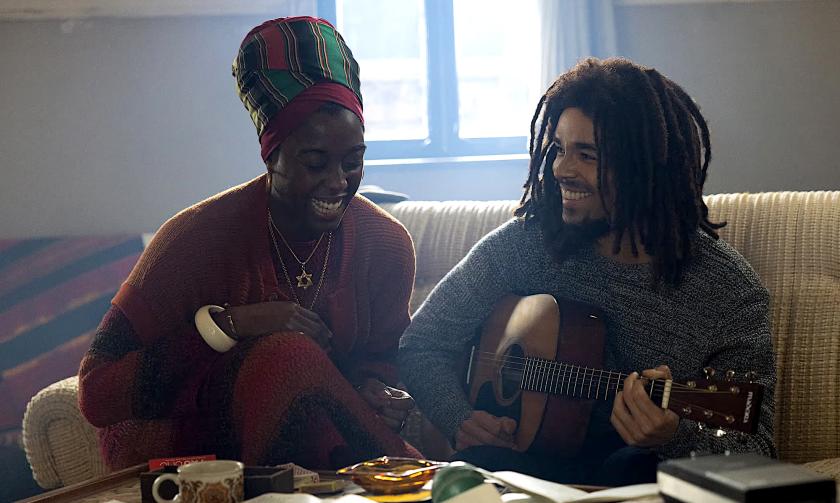It was only a matter of time before Bob Marley got his own posthumous biopic, and One Love isn’t the worst you’ll see. For instance, it’s miles ahead of the Elton John flick Rocketman, and at least it’s an hour shorter than Baz Luhrmann’s bloated Elvis misfire.
However, turning the life and artistry of a “soul rebel, natural mystic” into a mainstream film biography was always going to involve compromises and over-simplifications. Director Reinaldo Marcus Green (who helmed the King Richard tennis movie) has corralled a batch of screenwriters including Terence The Sopranos Winter. They’ve done a solid job of evoking Marley’s Jamaican background while ticking off the major bullet points of his career, not least the disappearing act pulled by his white father in his childhood. Yet the fact that this is emphatically the authorised version (with various Marleys including Bob’s son Ziggy scattered among the credits) means you can forget any ideas about dirt-digging or sensational revelations. “Hagiography” is as good a description as any.
 Green at least made a good call by keeping the timescale tight. The narrative homes in on the period between the 1976 assassination attempt in an anarchic Jamaica which barely injured Marley, but left his wife Rita and manager Don Taylor more seriously hurt, and the “Smile Jamaica” concert in 1978 at which Marley was able to symbolically unite the island’s political rivals Michael Manley and Edward Seaga. In between, Marley and the Wailers had skipped town and encamped themselves in London, where they recorded Exodus, destined to be hailed as the “album of the century” in Time magazine.
Green at least made a good call by keeping the timescale tight. The narrative homes in on the period between the 1976 assassination attempt in an anarchic Jamaica which barely injured Marley, but left his wife Rita and manager Don Taylor more seriously hurt, and the “Smile Jamaica” concert in 1978 at which Marley was able to symbolically unite the island’s political rivals Michael Manley and Edward Seaga. In between, Marley and the Wailers had skipped town and encamped themselves in London, where they recorded Exodus, destined to be hailed as the “album of the century” in Time magazine.
Front and centre is Kentish Town’s own Kingsley Ben-Adir (familiar from Barbie and Peaky Blinders, among other things) as Marley. The actor has confessed that he was daunted by the role, not least because he had no musical background whatsoever. Nonetheless, he managed to learn a few tricks on guitar and to find a singing voice good enough to make its way onto the soundtrack, albeit mixed in with the “real” Bob. His finest moment is a touching rendition of “Redemption Song”, sung solo to an acoustic guitar in his back garden.
But while Ben-Adir has studied Marley’s music and stage moves, his performance doesn’t reach into Marley’s spiritual depths and his devotion to Rastafarianism. Obviously the dialogue coaches have been working overtime and he makes a creditable stab at pronouncing Marley’s heavily-accented patois – there’s a jokey scene where an executive at Island Records can’t understand a word Marley is saying, and you can imagine there must have been some debate about whether to use subtitles – but you’re left feeling that this is a skilful impersonation rather than a deep dive into Marley’s soul.
 It possibly doesn’t help that Ben-Adir, at six foot two, is eight inches taller than Marley. His stage moves are consequently somewhat gawky and angular, where Marley’s seemed more contained and natural. Ben-Adir also radiates a cheerful, sunny kind of vibe, where the real Bob was thoughtful, guarded and enigmatic. But obviously, there could only ever be one Bob Marley.
It possibly doesn’t help that Ben-Adir, at six foot two, is eight inches taller than Marley. His stage moves are consequently somewhat gawky and angular, where Marley’s seemed more contained and natural. Ben-Adir also radiates a cheerful, sunny kind of vibe, where the real Bob was thoughtful, guarded and enigmatic. But obviously, there could only ever be one Bob Marley.
Apart from Lashana Lynch’s punchy portrayal of Rita Marley, always supportive of her husband’s artistic calling while pragmatic enough to live with his infidelities, the supporting cast don’t get a lot of time to shine. James Norton delivers a rather smarmy performance as Island Records entrepreneur Chris Blackwell, a man well worth a biopic in his own right, while there’s a mildly comical appearance by a facsimile of The Clash playing “White Riot” in a London pub. Punk-era London is briefly caricatured as a scruffy wasteland where surly-looking coppers go looking for rioters to clobber, though scenes inside Basing Street recording studios evoke a comfortable intimacy. The musical highlight is the band onstage, playing "No Woman No Cry".
One Love is watchable enough, but it isn’t the monument to Marley that it thought it was going to be. You could do yourself a favour and have a look at Kief Davidson’s documentary ReMastered: Who Shot the Sheriff? on Netflix, which probes behind the assassination attempt on Marley.















Add comment